Carpenter Technology Corporation
 | |
| Public | |
| Traded as | NYSE: CRS |
| Industry | Iron & Steel |
| Founded | June 1, 1889 |
| Founder | James H. Carpenter |
| Headquarters | Reading, Pennsylvania, USA |
Area served | Northern and central America, Europe, Asia [1] |
Key people | Tony R. Thene President & CEO |
| Revenue |
$2,271.7 mil fy'13 |
|
$264.6 mil fy'13 | |
|
$146.5 mil fy'13 | |
| Total assets |
$1.583 billion June'10 cur $820.2 mil |
| Total equity |
$573.2 million |
Number of employees | 4,800 (Dec'10)[4] |
| Website | www.cartech.com |
Carpenter Technology Corporation is an international developer, manufacturer and distributor of cast wrought and powder metallurgy specialty alloys/metals including superalloys, ultra-high strength steels, and stainless steel, as well as titanium alloys in a range of product forms. Headquartered in Reading, Pennsylvania, Carpenter Technology maintains manufacturing and distribution operations throughout the United States, Mexico, Europe and Asia. Its most recent facility is a service center in China.
In addition to the specialty alloys operation based in Reading, Carpenter acquired Dynamet Incorporated, Washington, Pa., a titanium alloy producer, and placed its tool steel and powder metallurgy business in the Carpenter Powder Products unit during the 1990s. In January 2011, the company announced the acquisition of Houston-based Amega West Services for $54 million; the deal expands Carpenter's business in the oil and gas drilling market (Amega West manufactures and services complex drilling components).[5]
About 35% of revenue comes from business abroad, over half of that from Europe (56% of international sales), 22% from the rest of North America (Mexico 14%, Canada 8%), Asia pacific 17% with the rest of the world accounting for the other 5%.[1] For the fiscal year ended June 2010 company net sales amounted to $1.2 billion 54% of which came from the sale of special alloy products (up 3% from the year before), 33% from stainless steels (down 1%), 9% from titanium products (down 1%) and 4% from other types (down 1% from the previous year). The aerospace (43% of revenue) and industrial (23%) industries are by far the largest end users of Carpenter Technology; their relative importance to business was unchanged between 2009 and 2010. Among other end users ($403.9 million in business in 2010) the consumer endustry (10% of net sales) was most important (breaking a tie with medical the year before) followed by medical (9%) and automotive (8%).[6]
Beginnings
The company was founded by James H. Carpenter and a small group of New York City investors on June 1, 1889 as the Carpenter Steel Company. He envisioned methods to improve the process of steel manufacturing. In 1896, James Carpenter received the company's first patent for an improved air-hardened steel. In 1937 the company went public and began trading on the New York Stock Exchange.
Markets
During the early 20th century, Carpenter's "special" steels were used in Wright Brothers' heavier-than-air “aeroplanes,” and today Carpenter supplies specialty materials that have been used in jet engine blades, electronics, landing gear, flap and slat track components, and titanium alloy fasteners, among other uses.[7]
Also around this time, Carpenter began supplying steels to the makers of “motor cars” for valves, connecting rods, axles, steering knuckles, etc.
Carpenter’s experience in these early markets led to materials advances in the energy, medical, industrial and consumer products industries in the coming decades.
Materials Experience
By the 1920s, Carpenter devoted research to a new realm of specialty metals: stainless steels.[7] Carpenter metallurgists pioneered improvements and in 1928, announced the world’s first free-machining, straight-chrome stainless, Type 416 (still in use today). Other improvements and alloy development followed, culminating in an improved-machinability family of machining bar, Project 70+ stainless, in 2002.
In high-strength alloys, Carpenter received a patent in 1992 for super-strong AerMet 100 alloy, first used for the landing gear on aircraft-carrier-based jet fighters. AerMet 100 was named one of the top material advances of the decade by the National Association for Science, Technology and Society.[7]
More recently, Carpenter developed the Carpenter CTS family of 14 alloys to assist knife blade designers in alloy selection.[8] In 2009 Carpenter began supplying its cobalt-based BioBlu 27 alloy into the jewelry industry and in 2010, developed ACUBE 100 alloy, a beryllium-free material for bushings and bearings. Also in 2010, Carpenter launched PremoMet alloy to consider for high demand diesel engine components.
Products, Industries and Brands
Products are marketed under a number of brand names, in the aerospace industry they are Hiperco alloys(avionics), Pyromet alloys (pylon and fuselage fasteners, engine components), Custom 465 stainless (flap and slat track, landing gear components) and AerMet alloys (landing gear) and in the medical industry BioDur alloys (fracture fixation), and Micro-Melt powder alloys (artificial disks and implants). Energy applications products are used in oil and gas drilling (drill collars, safety cables), power generation (disks, shafts, turbine blades) as well as other specialty applications. The industrial industry is supplied with valves and weldings, automotive with fuel injectors, engine valves, those used for safety, consumer with housing, electronics, sports and medical with hip and knee replacements, surgical instruments, vascular devices and other products that aid in treating bone fractures.[1]
Corporate responsibility
On June 18, 2002, five plaintiffs filed a suit against Carpenter Technology for cost recovery and contribution to recover costs that had been paid to the EPA pursuant to certain consent decrees.[9] A settlement of $21,800,000 was reached in 2011.
According to a 2009 article in the Philadelphia Business Journal, "Carpenter Technology Corp. near Reading released more than 1.2 million pounds of toxic chemical waste into the Schuylkill River and was the fourth-largest polluter of toxic chemicals in Pennsylvania in 2007."[10] However, it is not clear whether the discharge amounts were within the allowed federal permit limits.[10]
Gallery
-
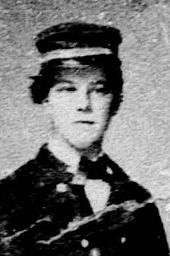
James Henry Carpenter in 1861 or 1862 in the Union Navy at about age 15.
-
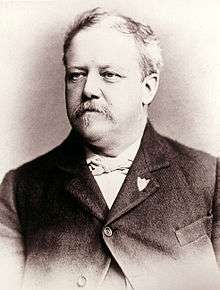
James Henry Carpenter, about 1895, founder of Carpenter Steel Company, now Carpenter Technology Corporation.
-

Carpenter Steel Company Plant in 1893, Reading, Pa, looking east.
-
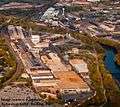
The Carpenter Steel Company Plant, now called Carpenter Technology Corporation about 2010, looking north.
-
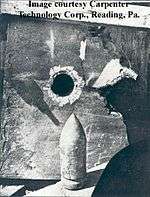
Carpenter Steel Company projectile test on steel plate circa early 1890s.
-

Carpenter Steel Company in the 1890s pouring steel into crucibles.
-
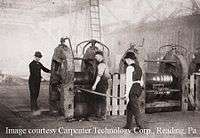
Carpenter Steel Company in the 1890s showing a rolling mill.
-
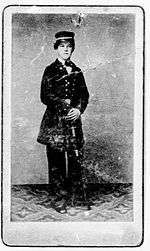
Full picture: James Henry Carpenter in 1861 or 1862 in the Union Navy at about age 15.
See also
References
- 1 2 3 "JTVIR Conference". 2009-03-31.
- ↑ "Carpenter Technology Corporation 2013 Revenue / EPS Summary". 2014-04-04.
- 1 2 "Carpenter Technology Corporation 2013 Annual Report". 2013-08-23. Archived from the original on 2014-04-07.
- ↑ "Carpenter Technology Corporation page". 2014-04-14.
- ↑ "Carpenter Tech Buys Amega West Services For About $54 Mln". January 2011.
- ↑ "Carpenter Technology Corporation 2010 Fiscal Year SEC 10 K Report". 2010-08-20. Archived from the original on 2011-07-28.
- 1 2 3 Carpenter History, accessed 2009-12-11
- ↑ About Carpenter knife blade alloys, accessed 2009-12-11
- ↑ "Lawsuit against Carpenter" (PDF).
- 1 2 "Two companies responsible for bulk of river pollution". 2009-11-09.